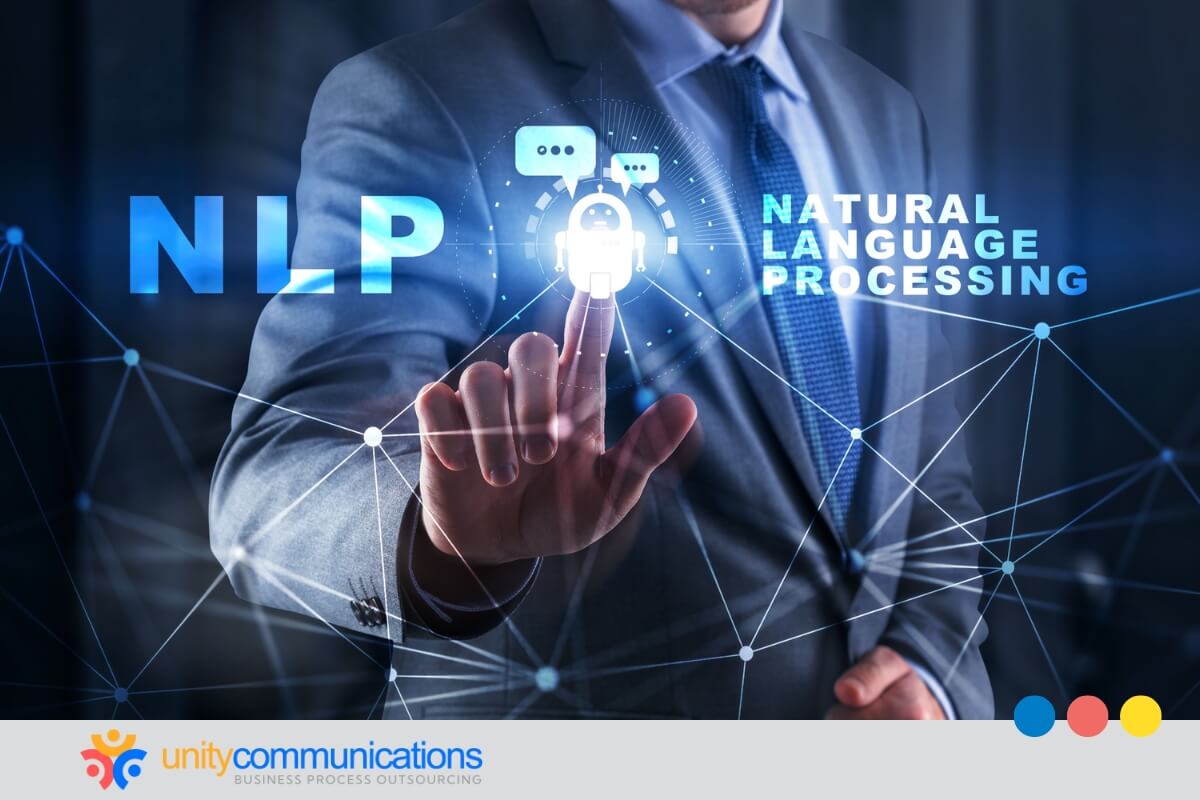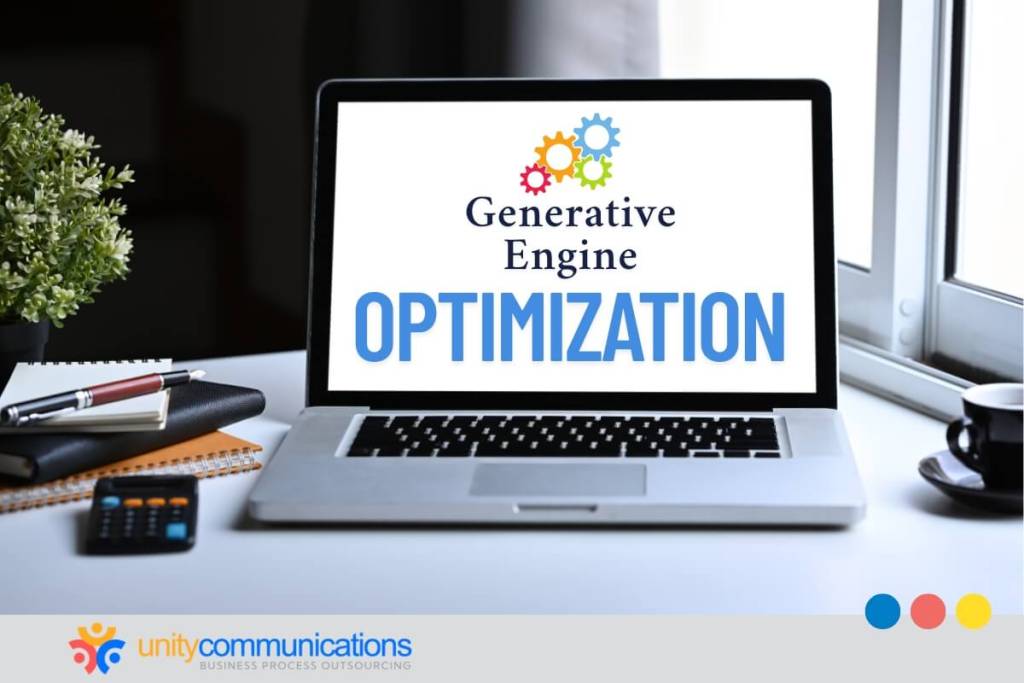IN THIS ARTICLE
Table of Contents
The rise of artificial intelligence (AI) platforms such as ChatGPT, Claude, and other large language models (LLMs) is fundamentally changing search behavior. Today’s consumers increasingly rely on generative AI for recommendations, answers, and insights.
Generative engine optimization (GEO) is key to establishing a solid brand presence in AI-generated responses. However, GEO demands specialized expertise and resources to ensure visibility and traffic. This is where business process outsourcing (BPO) can make a significant impact.
Keep reading to learn how leveraging BPO in generative engine optimization can position your brand for success in the era of AI-driven marketing and the changing digital landscape.
What is GEO, and why does it matter for SEO?

Generative engine optimization (GEO) has emerged as a game-changing tool that combines traditional search engine optimization (SEO) with generative AI to enhance visibility in evolving search results.
GEO matters for SEO because it addresses the growing shift in how consumers seek information. As more users turn to AI platforms for personalized recommendations and quick answers, businesses must adapt to remain visible.
Emerging trends underscore the urgency to adopt GEO. By 2028, brands’ organic search traffic could decrease by 50% as consumers use generative AI for searches. This shift can significantly disrupt traditional search behavior, making it essential for businesses to optimize their content for AI-driven platforms.
Although SEO has traditionally focused on boosting a brand’s visibility on search engines such as Google and Microsoft Bing, GEO is revolutionizing how brands appear on platforms powered by generative AI. Unlike conventional search engines that rank pages by keywords and backlinks, generative AI uses natural language processing (NLP) to deliver contextual, conversational responses based on user intent.
For example, Google integrates generative AI into its search experience through Search Labs, allowing users to test early AI-driven search experiments. These new capabilities, including AI Overviews, provide synthesized answers at the top of search results, reshaping how users interact with information.
Differentiating GEO and SEO
To effectively leverage GEO, businesses must understand how it aligns with and differs from SEO. GEO is a complementary digital marketing approach with its processes, but it builds on SEO’s foundation.
GEO and SEO overlap considerably, sharing core principles such as keyword research, content relevance, and optimization. SEO techniques often lay the groundwork for GEO, providing the structure and insights needed to optimize content for generative AI platforms.
Below is a detailed comparison highlighting the similarities and differences between GEO and SEO:
| Aspect | SEO | GEO |
|---|---|---|
| Purpose | Optimizes content for traditional search engines such as Google and Bing | Optimizes content for AI-driven platforms such as ChatGPT and Claude |
| Focus | Ranking web pages on search engine results pages (SERPs) | Generating relevant responses in AI conversations |
| Content style | Uses structured formats, keywords, and metadata for search engines | Emphasizes conversational phrasing and contextual relevance |
| Target platform | Search engines using algorithms for page ranking | Generative AI tools that respond directly to user queries |
| Optimization techniques | Keywords, backlinks, metadata, and mobile-friendliness | Conversational tone, user intent, and AI-specific formatting |
Combining GEO and SEO creates a robust digital marketing strategy that enhances visibility across all search environments. They can maximize your brand’s online presence and help you stay competitive in an evolving digital landscape.
The role of BPO in generative engine optimization

As GEO gains traction in digital marketing, many companies face challenges such as limited resources, technical expertise, and the growing demand for AI-ready content. BPO in generative engine optimization offers the support businesses need to tackle these challenges, making it easier to stay competitive in the world of AI-driven search.
Here’s what BPO providers can do:
Refine content for AI-driven search algorithms
Refining content for AI-driven search algorithms is essential in GEO. Unlike traditional SEO, which emphasizes keywords and backlinks, GEO focuses on semantic relevance and contextual accuracy. This shift requires businesses to align their content with the criteria used by AI tools to rank information effectively.
BPO providers bring specialized expertise and tools to this process. They analyze content for gaps, restructure it for clarity, and ensure it meets the latest algorithmic standards. These efforts enhance search visibility and keep businesses competitive in an environment where AI continually redefines content expectations.
Leverage natural language processing (NLP) for GEO
Integrating NLP into GEO is transformative, enabling content that mirrors natural user communication. BPO providers utilize NLP technologies to analyze linguistic patterns, tone, and user intent so that content resonates with audiences and aligns with AI-driven algorithms.
This approach is highly effective. According to a 2023 report by Twilio Segment, 92% of companies use AI-driven personalization to drive growth. About 56% of consumers say they will become repeat buyers after a personalized experience.
By integrating NLP, BPO firms help businesses produce conversational, contextually rich content tailored to user intent. This improves search rankings and enhances user experience, which is critical in today’s competitive digital marketplace.
Identify conversational queries and semantic keywords
Understanding conversational queries and semantic keywords is crucial in AI-driven search. Unlike traditional keyword strategies, GEO focuses on intent and the relationships between words, allowing businesses to better align their content with user expectations.
BPO providers leverage tools to identify these patterns and uncover valuable insights into search behavior. Businesses can craft content that answers real user questions while improving visibility and engagement with AI-powered algorithms.
Use structured data to improve AI content interpretation
Structured data enhances AI’s ability to interpret and display content effectively. By using structured data formats, such as schema markup, businesses provide clear signals that improve search rankings and enhance results in rich snippets and voice searches.
BPO providers excel at implementing structured data strategies, ensuring that AI can contextualize content accurately. This targeted approach increases visibility and helps businesses meet user expectations.
Benefits of BPO in generative engine optimization

Leveraging BPO in generative engine optimization provides value for businesses. Reduced costs, improved efficiency, and flexible strategy are among the strategic benefits prospective clients can expect.
Explore these compelling BPO advantages below:
- Cost efficiency: BPO eliminates the need to hire and train in-house teams for GEO. It reduces expenses on AI tools as the BPO team comes with existing infrastructure. The practice minimizes operating costs with flexible BPO pricing models while maintaining high-quality deliverables.
- Access to expertise and technology: BPO providers offer specialized knowledge in NLP and semantic keyword research. They leverage AI-driven tools for content analysis and optimization. Additionally, BPO teams keep their strategies up-to-date with the latest algorithmic changes and industry best practices.
- Scalability and flexibility: BPO offers the ability to scale GEO efforts based on demand. The practice supports rapid content production during peak times or campaign launches. BPO providers adjust resource allocation to align with market trends and business priorities.
- Improved efficiency and focus: BPO teams handle time-intensive GEO tasks such as keyword research, content structuring, and performance monitoring, enhancing workflow efficiency. They also allow internal teams to focus on core business objectives and strategic planning.
- Insights into emerging trends: BPO firms utilize advanced analytics tools to track AI search behavior and competitor strategies. They identify new opportunities in conversational search and voice-activated queries. BPO provides actionable data to refine GEO strategies and stay competitive.
Tools BPO firms use to analyze AI-driven search trends
The rise of AI has significantly transformed the way businesses approach search optimization. With the global AI market projected to grow from $214.6 billion in 2024 to $1.3 trillion by 2030, companies turn to AI-powered solutions to stay ahead of the competition.
BPO organizations utilize advanced AI tools and technologies to monitor and analyze trends in AI-driven search, understand user behavior, identify algorithm updates, and refine strategies for GEO.
Examples include the following:
- AI-powered analytics platforms: Tools such as Google Analytics 4 (GA4) and Adobe Analytics enable BPO firms to track user interactions, traffic sources, and content performance. AI integration within these platforms helps detect real-time patterns and trends, allowing for data-driven decision-making.
- Keyword and intent analysis tools: BPO firms use Semrush, Ahrefs, and Moz to identify high-performing semantic keywords and analyze search intent. These tools go beyond traditional keyword research by focusing on conversational queries and long-tail keywords favored by AI-driven search engines.
- NLP tools: NLP platforms such as IBM Watson and OpenAI’s GPT APIs assist in analyzing user queries and optimizing content for better relevance and context. They ensure that content matches the natural communication styles that modern search algorithms prioritize.
- Algorithm monitoring tools: Tools such as Rank Ranger and Algoroo track changes in search engine algorithms, providing early insights into potential impacts on GEO strategies. This proactive monitoring enables BPO firms to adjust their optimization tactics before AI changes affect performance.
- Structured data testing tools: Google’s Rich Results Test and Schema Markup Validator help BPO firms optimize structured data for better search engine interpretation. Businesses benefit from enhanced search features such as rich snippets and voice search compatibility.
- Competitor analysis tools: Platforms such as SimilarWeb and SpyFu allow BPO firms to analyze competitors’ performance, strategies, and content trends. Businesses can refine their GEO strategies by identifying gaps and opportunities to gain a competitive edge.
The bottom line
As AI platforms redefine how consumers search and engage, traditional SEO no longer guarantees visibility. GEO fills this gap, but mastering it requires expertise and resources that can be challenging to build internally.
BPO providers are powerful allies for navigating today’s AI-driven landscape. They specialize in refining AI-focused content strategies and using advanced tools to deliver results. Partnering with a BPO helps you save time, cut costs, and stay ahead while focusing on what matters most: growing your business.
Want to see how BPO can transform your GEO efforts? Let’s connect and explore how our solutions can help your business dominate the AI-driven market.





